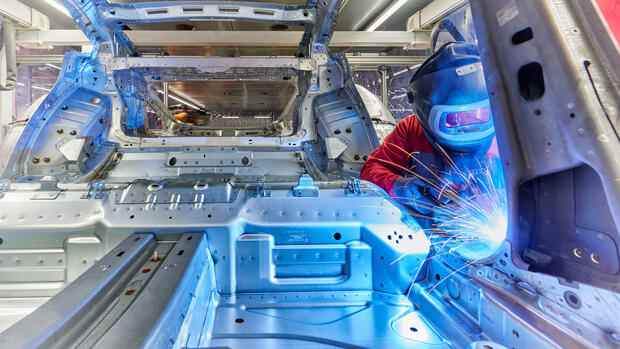High energy prices are causing difficulties for many manufacturing companies.
(Photo: AUDI AG)
Berlin The energy crisis is giving the industry a hard time. A number of companies feel compelled to take serious consequences: 17 percent of industrial companies want to reduce their production because of the high energy prices.
About every twelfth industrial company (eight percent) wants to relocate its production due to the increased costs. Companies from the automotive industry (17 percent) feel compelled to do so particularly frequently.
This is the result of a new economic survey by the Association of German Chambers of Industry and Commerce (DIHK), which is available to the Handelsblatt in advance. For DIHK General Manager Martin Wansleben, the numbers are alarming: “The situation in our economy is dramatic – consistent crisis management and faster action are now absolutely necessary.”
In its new survey, the DIHK asked the companies separately how they wanted to react to the crisis. Almost three out of five companies (59 percent) plan to pass most of the increased energy costs on to their customers. Investments in energy efficiency measures are an option for 38 percent.
Top jobs of the day
Find the best jobs now and
be notified by email.
For many companies, however, these steps are not enough. “The lights are on red for us because we can see the speed at which the financing situation in companies is deteriorating – a topic that had disappeared from the agenda for many years,” says Wansleben.
>> also read: Is heating oil becoming more expensive again or are prices falling?
According to the DIHK survey, the situation is particularly bleak in the automotive industry. 43 percent of car manufacturers now describe their financial situation as problematic, and the number of suppliers is almost half (49 percent) – a strong increase since early summer. The proportion of suppliers who see themselves threatened with insolvency has tripled from one to three percent in the same period.
Energy costs are so depressing that 16 percent of car manufacturers have already reduced their production and 17 percent want to relocate their production. In view of the record inflation, the depressed mood of consumers and the reluctance of companies to invest, the domestic sales market is also causing them concern. The proportion of companies that see domestic demand as a business risk has increased from 41 to 58 percent.
After high energy and raw material prices, labor costs are now the second-biggest risk in motor vehicle construction. 64 percent of companies now consider labor costs to be a risk, and the value has never been so high. The shortage of skilled workers ranks third among the greatest risks.
This dichotomy is also reflected in the labor market. On the one hand, companies are becoming more reluctant to hire due to the uncertainty and high prices.
Companies avoid layoffs
On the other hand, they avoid redundancies – out of concern that they will no longer be able to find staff when the economy picks up again. “Usually there is only one of two things: a strong need for labor or a weak economy. But at the moment scarcity meets crisis,” says Enzo Weber from the Institute for Labor Market and Vocational Research (IAB).
The IAB labor market barometer fell for the sixth time in a row to 100.2 points. It is only just above the neutral mark of 100 points.
The local employment agencies in Germany, which are surveyed monthly for the early indicator, continue to see a positive employment trend. However, they also expect unemployment to rise at the same time, which is mainly related to the admission of Ukrainian refugees. “The immigration of refugees from the Ukraine suddenly increases the labor force potential in Germany and thus initially unemployment and – with a greater time lag – employment,” says Weber.
The high prices are causing difficulties for many companies. According to a survey by the Ifo Institute, the proportion of those who see their existence threatened is significantly lower than during the corona pandemic. “In view of the strong economic slowdown, the companies are proving to be very robust,” Ifo researcher Klaus Wohlrabe assesses the situation more optimistically than the DIHK.
In retail, 11.6 percent of companies report a situation that threatens their existence. The situation remains difficult for many companies in the textile industry, but concerns have also increased in the metal industry. “The increased energy prices have led to a slightly increased fear of existence, especially in energy-intensive sectors,” says Wohlrabe.
More: Industrial Metaverse: “We need to reprogram the machines much faster”

